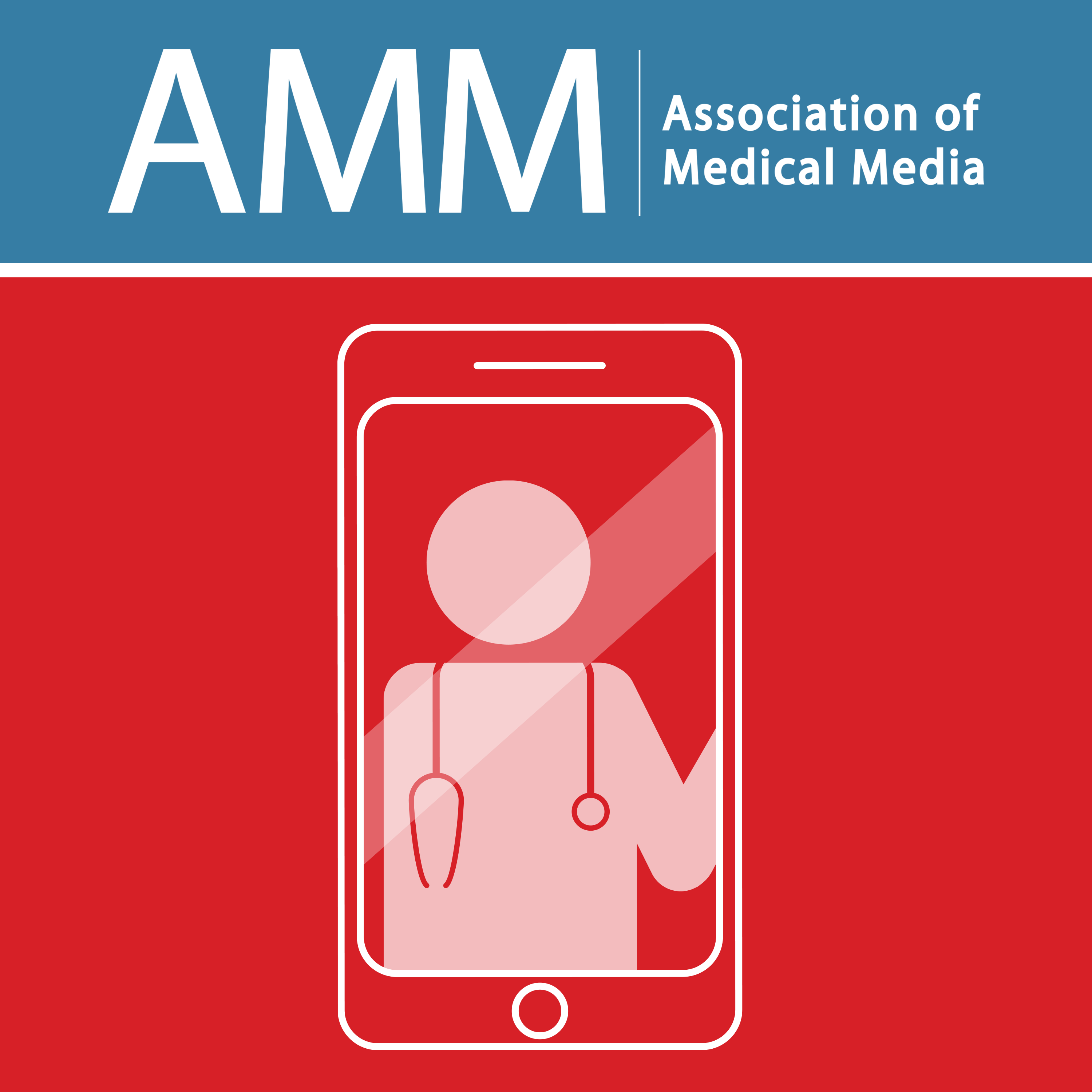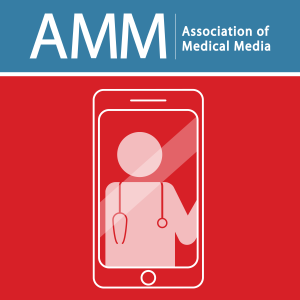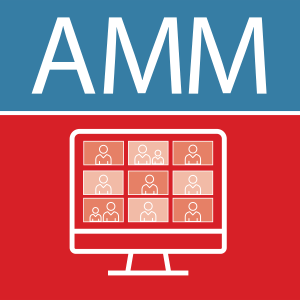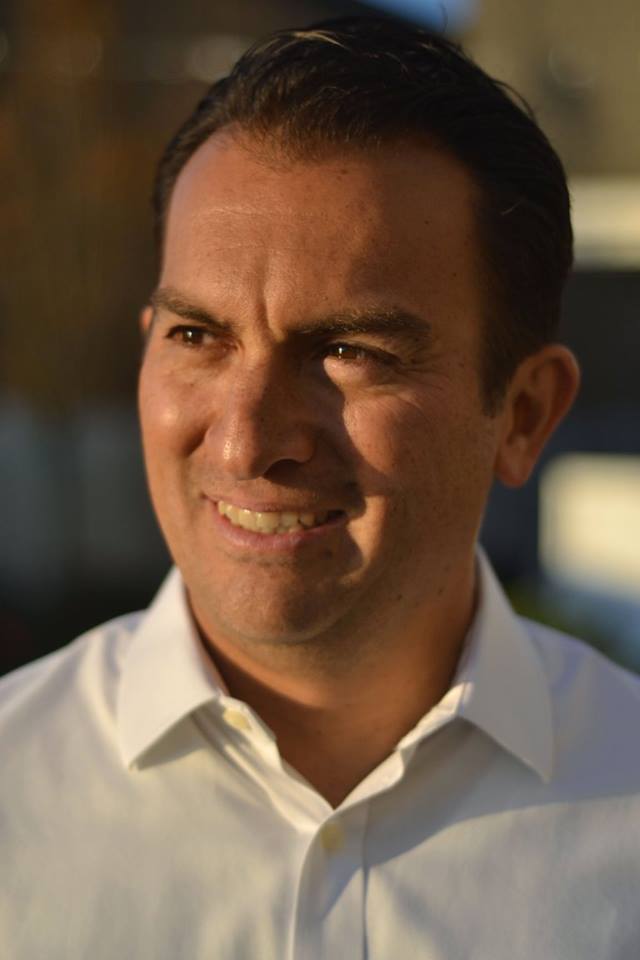
2.8K
Downloads
23
Episodes
The official podcast of the Association of Medical Media, AMM Conversation is a serial podcast exploring key issues and challenges in medical media and marketing. Hosted by Jason E. Carris, AMM Conversation is available on Apple Podcasts, Google Podcasts, Stitcher, Spotify, and wherever you listen to podcasts.
Episodes

Friday Apr 03, 2020
Introducing Season One of the AMM Conversation
Friday Apr 03, 2020
Friday Apr 03, 2020
Welcome to AMM Conversation, the official podcast of the Association of Medical Media (ammonline.org). This first season of AMM Conversation will explore the landscape and challenges of data privacy in the 21st century of medical media. Our guests this season include Jon Bigelow, Executive Director of Coalition for Healthcare Communication, Stephanie Hanaway, Director of Journal Media at the American Academy of Family Physicians, and David Reim, Chief Privacy Officer at DMD. Subscribe now.

Tuesday Apr 21, 2020
Tuesday Apr 21, 2020
Length: 29:39
Guest: David Reim, Digital Privacy Officer, DMD
Host: Jason E. Carris
David Reim, Chief Privacy Officer at DMD, joins the AMM Conversation to explore data privacy and medical media. A veteran of healthcare marketing and communication, Reim dives i nto best practices on data acquisition, the legislative landscape, and contrasts medical media compliance vs. the “wild wild west” of consumer marketing.
nto best practices on data acquisition, the legislative landscape, and contrasts medical media compliance vs. the “wild wild west” of consumer marketing.
Reim says when it comes to data acquisition, the best practice is to obtain a direct opt-in from every user. “No laws require an opt-in in the U.S," he says. "In Europe, GDPR requires an opt-in. Plus, GDPR does not allow a “master” opt-in. You can’t get an opt-in for one newsletter and send them a dozen.”
He says the U.S. is in “no man’s land” when it comes to universal data privacy regulation. “Some legislation is at the state level, so it only applies to some people in the U.S. I think we eventually will have federal legislation,” he says. “Right now … [regulation] is highly fragmented and quite a difficult time for companies that want to do the right thing and be compliant.”
Reim notes, in his experience, 99% of medical media is operating with a “high level of integrity. The vast majority of players in the healthcare market are doing the right thing or at least have the intention of doing the right thing. I think any legislation is not aimed at these folks; it is aimed at folks who aren’t doing the right thing.”
Two keys for collecting data from an end user: transparency and end user control of their data. He says companies can take an offensive or defensive stance with regard to data privacy. Defense means privacy compliance in order to avoid litigation. “Offensively, is to say, ‘this is what my users want and I am going to be very up front with their data and allow them to control it as much as possible.”
Privacy policies on a website or email can tell you a lot about the user-business relationship. He says a privacy policy should clearly, in plain English, explain how the end users’ data will be managed.
Resources:
Check out DMD’s Data Privacy Series.
Read AMM’s Principles of Online Privacy statement (PDF).
Next: Ep. 2 features data privacy discussion with Stephanie Hanaway, Director of Journal Media at the American Academy of Family Physicians, and an AMM Board Member.
Contact us: AMM Conversation is the official podcast of the Association of Medical Media. Send questions and comments about this podcast series to jcarris525@gmail.com.

Tuesday Apr 21, 2020
Tuesday Apr 21, 2020
Length: 25:33
Guest: Stephanie Hanaway, Director of Journal Media, American Academy of Family Physicians, board member, Association of Medical Media
Host: Jason E. Carris
 Stephanie Hanaway, Director of Journal Media, American Academy of Family Physicians, joins the AMM Conversation for further discussion about data privacy in relation to medical media. Hanaway manages three peer-reviewed journals and a subscription-only periodical. She is a board member of the Association of Medical Media and previously spent a number of years in commercial publishing.
Stephanie Hanaway, Director of Journal Media, American Academy of Family Physicians, joins the AMM Conversation for further discussion about data privacy in relation to medical media. Hanaway manages three peer-reviewed journals and a subscription-only periodical. She is a board member of the Association of Medical Media and previously spent a number of years in commercial publishing.
Hanaway says AAFP members have high expectations for data privacy. She says “trust” is the AAFP’s guiding principle. “As an association, if we break our members’ trust, we don’t have members, and then we do not exist,” she says. “They trust us with their data. We are not going to break that trust, period.”
She explains the current regulatory landscape is frustrating to businesses already adhering to strict data privacy guidelines. “It is very troubling from an administrative burden perspective, because, once again, all of these laws are trying to prevent or make transparent things we already are doing. But now for each state we have to jump through hoops.”
She also laments the fact Facebook and Google take the lion’s share of digital advertising, but more so because of the boundaries big tech companies push (ahem, break) with their users’ data. Now, with many advertisers accepting of such practices, “it makes it harder for those of us trying to do it the right and ethical way to compete in that world. … Consumers are catching on, but we always are going to be battling.”
AAFP was reticent to work with any digital vendors up until just a few years ago, when the reality of publishing in the 21st century requires partnerships. Hanaway says AAFP has an extremely “thorough process” to vet vendors and protect data storage and sharing; she suggests all publishers and associations should do so likewise. “We are extraordinarily careful with digital [vendors] to make sure we are really nailed down legally.”
Hanaway helped create the AMM’s Principles of Online Privacy statement, which published in the fall of 2018 following the Facebook-Cambridge Analytica scandal. “It’s not just a matter of principles and ethics, it is a matter of ethics… If your audience no longer trusts you, you don’t have a business anymore.”
Physicians do understand the trade-off of advertising exposure when engaging with medical media, she says. “If you use the data right, and they are going to be exposed to advertising anyway, shouldn’t that ad be helpful to the physician?” Hanaway thinks AAFP members are OK with and expect such a transaction, but re-selling the user data? Her physicians likely would say “no, thank you.”
She implores medical marketers to avoid “getting lost in the data,” and medical media companies to “guard that data with your life.”
References:
- NPR’s comprehensive look at the Cambridge Analytica scandal, including Facebook’s $643k fine and changes to privacy policies. And check out the United Kingdom’s Data Protection Act of 1998, the law that triggered the case against Facebook.
- Read the AAFP’s Privacy Policy.
- Read AMM’s Principles of Online Privacy statement (PDF).
Next: Ep. 3 features data privacy discussion with Jon Bigelow, Executive Director of the Coalition for Healthcare Communication, and an AMM Board Member.
Contact us: AMM Conversation is the official podcast of the Association of Medical Media. Send questions and comments about this podcast series to jcarris525@gmail.com.

Tuesday Apr 28, 2020
Tuesday Apr 28, 2020
Length: 29:24
Guest: Jon Bigelow, Executive Director, Coalition for Healthcare Communications
Host: Jason E. Carris
Jon Bigelow is executive director of the Coalition for Healthcare Communication. The coalition membership includes medical publishers, advertising agencies, marketing firms, scientific communications firms, point of care content providers, and digital platforms.
 As big data and data security have grown in the past decade, the federal government has been “reluctant to get involved,” says Bigelow, past president and current board member of the Association of Medical Media. He says many of the companies involved in data are monopolies, yet the government has “not taken the same anti-trust stance as it did previously with Standard Oil, the railroads, or Bell breakups.”
As big data and data security have grown in the past decade, the federal government has been “reluctant to get involved,” says Bigelow, past president and current board member of the Association of Medical Media. He says many of the companies involved in data are monopolies, yet the government has “not taken the same anti-trust stance as it did previously with Standard Oil, the railroads, or Bell breakups.”
Companies that harvest and monetize data “have been allowed to self-regulate” as the government has, for the most part, played a “passive, hands-off role. But the anger has been building the past few years.”
He notes concerns with security breaches and digital platforms, like Facebook, that have allowed the use of personal data for purposes the consumer never intended. “The Cambridge Analytica event was a big deal.”
Data privacy policy was largely driven by the European Union and its GDPR, which “essentially added more specifics to the definition of what is personal data, instituted a very rigorous opt-in mechanism, and provided, at least initially, severe penalties,” he says.
In 2019, California passed the first sweeping legislation (CCPA) in the U.S. aimed at protecting consumers’ data. “It was very quickly designed legislation,” Bigelow says. “To this day, it is still being clarified by their Attorney General. ... It is enforceable as of July 1, 2020.”
CCPA improved mechanisms for consent, but has “more of an opting-out emphasis,” he says, “so that a consumer has the right to know what data is being collected, where it was collected from, what is being done with that data, by whom, and the ability to opt-out.”
The big problem is the potential for every state to create its own privacy law(s), which is almost “untenable” from an industry perspective. “The second big issue is the burden on the consumer/user,” Bigelow says. “You don’t really know what you are agreeing to… to think simply clicking ‘I Agree’ is consent is laughable.”
Bigelow does see light at the end of the tunnel, in terms of much-needed federal regulations vs. a patchwork of state laws. Despite the dysfunction in Washington, D.C., there appears to be bipartisan agreement that “one, something needs to be done to protect the privacy and security of individuals data; and second, it needs to be done at a federal level. This is one of the few areas where there is consensus.”
Medical media should take note of work from Privacy for America, an industry group attempting to establish broad principles for a privacy law, of which many of the principles are being used in the dozens of bills circulating the Beltway. The principles would act as federal guard rails, the same as safety standards for automobiles, Bigelow explains. Key pillars of the effort:
- Create a Data Protection Agency, staffed with experts and focused on data privacy.
- Define acceptable areas of use and ways of collecting data.
- Define approaches to data use that are unreasonable.
When asked about the privacy questions the coalition’s membership is asking: “For medical publishers and media placement firms, the big issue was with the Colorado legislation. … Advertising agency concerns were on the cyber security side, in terms of who is liable when data is breached. … Scientific communications firms are concerned with the use of algorithms to try to discern patterns in the data that might not be visible. Example: identify patients with a rare disease and being able to target communications to them or include them in a clinical trial. … The publication planning world is very much under pressure to get all clinical trial results into the literature very quickly, including negative results, and include full data sets. There is a lot of concern whether, in fact, they can put the full data sets in the public purview.”
Bigelow says he thinks the government’s view of data as a “public good” is changing for the positive, even though it might narrow an individual’s right to privacy. Whether it is Google and Apple tracking individuals’ movement during Covid-19 or clinical trials for rare disease research, or new safe harbor laws for rare disease research, he says data as a public good “is an issue that is going to be re-evaluated.”
Resources:
- Check out the Coalition for Healthcare Communication website for news, resources, and events related to healthcare marketing.
- Stay on top of key data privacy legislation: CCPA, GDPR, Colorado.
- Learn more about the Privacy for America.
- Read AMM’s Principles of Online Privacy statement (PDF).
Subscribe: Add the AMM Conversation to your playlist on Apple Podcasts, Google Podcasts, Spotify, Stitcher or wherever you enjoy podcasts.
Next: Ep. 4 will conclude the data privacy discussions.
Contact us: AMM Conversation is the official podcast of the Association of Medical Media. Send questions and comments about this podcast series to jcarris525@gmail.com.

Thursday May 21, 2020
Thursday May 21, 2020
Length: 26:42
Topic: Data Privacy and Medical Media
Guest: Augustine Fou, PhD, Digital Ad Fraud Investigator, Marketing.Science Consulting Group
Host: Jason E. Carris
Dr. Fou, formerly the Chief Digital Office at Omnicom and a recognized ad fraud expert, joins the AMM Conversation as we wrap up our exploration of data privacy and medical media. Dr. Fou is an MIT-trained scientist who has more than two decades of experience working with healthcare clients. He’s taught digital strategy at NYU and Rutgers. His clients run the gamut of marketers, publishers, and ad tech firms.
 Dr. Fou said he considers 2020 a transition year for data privacy, with regulators taking notice that privacy issues should be taken more seriously. As consumers better understand the ways their data is being used and abused, he says government will move to, at least, “put guard rails around data privacy.”
Dr. Fou said he considers 2020 a transition year for data privacy, with regulators taking notice that privacy issues should be taken more seriously. As consumers better understand the ways their data is being used and abused, he says government will move to, at least, “put guard rails around data privacy.”
Like others interviewed in this podcast, Dr. Fou is concerned about the lack of federal regulation. “Here in the U.S. we have yet to even start enforcement,” he said, adding there are a lot of ways companies can “game the system and not comply with regulations when they are passed.”
Bad actors in digital media/marketing “never follow rules anyway,” he explained, “so I don’t see any new regulations causing a decrease in fraud.”
Interestingly, the Facebook-Cambridge Analytica scandal and the consumer backlash to the invasion in privacy was “not a lesson that (Facebook) is going to learn from because it is at odds with their business model,” he said. “If privacy legislation is at odds with business models, big tech companies likely are going to continue with their business until they get caught and get fined. … It’s going to be very hard to enforce any new regulations.”
He said the Covid-19 pandemic might provide opportunities for data companies to exploit the rules. Apple and Google teaming on a contact tracing app is “right at the cutting edge,” Dr. Fou said, “but consumers will have to decide on their own. The question remains if we trust these big companies. … Apple has a long track record of having sensitivity to consumer privacy.”
Medical media has always had a higher level of respect to physician and patient privacy, he said, but the advent of ad tech platforms brought about a number of unexpected outcomes and unintended consequences. He described a time during his digital marketing days when NPI numbers were exposed in the URL of the web page, a problem that was quickly fixed once identified.
Dr. Fou also described in detail his definitions of “good publishers” and “bad actors” in digital media, with respect to protecting the advertisers. “Good publishers go above and beyond and take proactive steps, such as not serving ads when they know a bot is on the website, or filtering for known bots coming from data centers. They protect the advertisers,” he said.
The bar should be raised in medical media. “Everyone is conscious of it and is trying to do the right thing,” he said. “But what other steps can you take? Instead of having 30 or 40 third-party trackers on your website, you might want to only have five.
He encouraged medical media to “keep evolving with your data privacy. Be proactive, and do not wait for legislation.”
Connect with Dr. Fou: LinkedIn or Twitter @acfou
References:
- Check out Dr. Fou’s research slides and presentations.
- Read AMM’s Principles of Online Privacy statement (PDF).
Up Next: This concludes Season One of the AMM Conversation podcast. Season Two of the podcast will explore the new paradigm of medical media, in light of restrictions placed on U.S. businesses due to the Covid-19 pandemic. Expected guests include: Matt Holland (Healio Strategic Solutions), Kristin Carty and Denis Conlon (Elsevier), and Dave Emery (Kantar).
Contact us: Send questions and comments about this podcast series to jcarris525@gmail.com.

Friday Jun 12, 2020
Season 2: The New Normal in Medical Media
Friday Jun 12, 2020
Friday Jun 12, 2020
Welcome to AMM Conversation, the official podcast of the Association of Medical Media (ammonline.org). Season Two explores the "new normal" in medical media, as the industry copes, adapts, and excels in the face of the global health crisis. Guests this season include Healio's Matt Holland and JoanMarie Stiglich, Elsevier's Denis Conlon and Alejandro Alvarez, and Kantar's David Emery. Listen weekly via Apple Podcasts, Spotify, Google Podcasts, Stitcher, or wherever you enjoy podcasts.

Sunday Jul 05, 2020
Sunday Jul 05, 2020
TOPIC: The New Normal in Medical Media
LENGTH: 28:12
PANELISTS: Matthew Holland, John C. Carter, Joan-Marie Stiglich
HOST: Jason E. Carris

Season Two of the AMM Conversation, the official podcast of the Association of Medical Media, explores the "new normal" in medical media. In this episode, we are joined by a trio of medical publishing experts discussing how the industry is coping, adapting, and excelling during the Covid-19 pandemic.
Our panelists today are from Healio and its parent company, The Wyanoke Group:
- John C. Carter is Chief Operating Officer of The Wyanoke Group. Healio, Healio Strategic Solutions, Healio Live and SLACK Incorporated are wholly owned subsidiaries of The Wyanoke Group. John has been with the company since 1982.
- Joan-Marie Stiglich is Chief Content Officer at Healio and a 25-year veteran of medical publishing. She has spent the duration of her career at the company.

- Matthew Holland is Chief Commercial Officer of Healio Strategic Solutions, where he is responsible for all print, digital and custom sales operations.
Resources:
Find additional medical media resources via AMM's Knowledge Exchange Center.
Next: Ep. 2 features further conversation about the new normal in medical media with Denis Conlon, Sumner Mering, and Alejandro Alvarez from Elsevier's Global Commercial Sales and Marketing Group. 
Contact us: AMM Conversation is the official podcast of the Association of Medical Media. Send questions and comments about this podcast series to jcarris525@gmail.com.

Monday Jul 06, 2020
Monday Jul 06, 2020
TOPIC: The New Normal in Medical Media

LENGTH: 41:26
PANELISTS: Denis Conlon, Alejandro Alvarez, and Sumner Mering of Elsevier's Global Commercial Sales and Marketing Group
HOST: Jason E. Carris
Season Two of the AMM Conversation, the official podcast of the Association of Medical Media, explores the "new normal" in medical media.
In this episode, we are joined by a trio of medical media experts discussing how the industry is coping, adapting, and excelling during the Covid-19 pandemic.

Our panelists today are from Elsevier:
- Denis Conlon is VP of Marketing for Elsevier's Global Commercial Sales and Marketing Group;
- Alejandro Alvarez is Director of Business Development and Strategic Partnerships
- Sumner Mering is a veteran in medical media and one of the group's Directors of Commercial Sales
Resources:

Find additional medical media resources via AMM's Knowledge Exchange Center.
Next: Ep. 3 features further conversation about the new normal in medical media with MedScapeLive!'s VP of Experiential and Learning Events Benji Kayne.
Contact us: AMM Conversation is the official podcast of the Association of Medical Media. Send questions and comments about this podcast series to jcarris525@gmail.com.

Monday Jul 20, 2020
Monday Jul 20, 2020
TOPIC: The New Normal in Medical Media
LENGTH: 35:38
PANELISTS: Benji Kayne, MedscapeLive!
HOST: Jason E. Carris
Season Two of the AMM Conversation, the official podcast of the Association of Medical Media, explores the "new normal" in medical media. 
In this episode, we are discussing how the industry is coping, adapting, and excelling during the Covid-19 pandemic.
Our guest is Benji Kayne, Vice President of Experiential and Learning Events at MedscapeLive!. Benji joined MedscapeLive! in February, having previously produced events for Google. With the rapid onset of the pandemic, the MedscapeLive! team deftly pivoted more than 150 in-person experiences to an all-virtual events platform in a matter of weeks.
Listen in as Benji discusses the challenges and successes of producing medical events in the virtual space.
Resources: Find additional medical media resources via AMM's Knowledge Exchange Center.
Next: Ep. 4 features further conversation about the new normal in medical media with industry veteran Dora Shankman, President and CEO of Shankman Marketing and Media Resources.
Contact us: AMM Conversation is the official podcast of the Association of Medical Media. Send questions and comments about this podcast series to jcarris525@gmail.com.

Monday Jul 27, 2020
Industry veteran Dora Shankman discusses the "new normal" in medical media
Monday Jul 27, 2020
Monday Jul 27, 2020
TOPIC: The New Normal in Medical Media
LENGTH: 35:18
GUEST: Dora Shankman, President & CEO, DPS Strategic Media Enterprises, LLC.
HOST: Jason E. Carris
Season Two of the AMM Conversation, the official podcast of the Association of Medical Media, explores the "new normal" in medical media.
In this episode, we are joined by Dora Shankman, a well-known name in healthcare marketing and advertising. Dora discusses how she and her clients are coping, adapting, and excelling during the Covid-19 pandemic.
Resources: Find additional medical media resources via AMM's Knowledge Exchange Center.
Next: Ep. 5 will be the final episode of Season Two, and will feature further conversation about the new normal in medical media with Sima Sherman of Sherman Medical Marketing Group, as well as insights from Eugene Lee and Jim Woodland of CMI/Compas.
Contact us: AMM Conversation is the official podcast of the Association of Medical Media. Send questions and comments about this podcast series to jcarris525@gmail.com.

